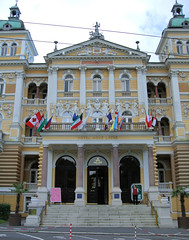Since the event that the two Ciaras ran in Killarney a while back, I’ve been chatting to some Irish Hotels about online marketing. I’ve shared my thoughts with them and am sharing them again here now.
There are a few ways that a hotel can use online resources such as blogs, Facebook and Twitter to both increase traffic to their website as well as get more people talking about them online and offline. Ranking well in search engines is all well and good but what can you offer if you and a hotel across the road have the same rates and are neck and neck on Google. If your friend recommends a hotel down the road that’s a little more expensive would you be inclined to go to them or at least their website? The real endgame here is getting members of the public to recommend your hotel, even when they never stayed but their friend did. It’s happening and online can make it happen more.
Searching for “hotels in Cork”, “Hotels in Dublin”, “cheap hotels Dublin” will result in you seeing some very competitive placings. Hotels spend well on search engine optimisation but it’s not just about those pages on your website. Do you have a presence on Twitter, Facebook, LinkedIn, YouTube, Flickr and other sites that rank very highly on Google? A hotel should do their best to own as much of the front page of Google as they can.

Photo owned by Jim Linwood (cc)
From the mechanics then, to the way the message is relayed. Personality. What way are you communicating with people? Are you fun and friendly? What do you know about the general area and fun things to say? Are you recommending good restaurants and places for tourists to go? Are you encouraging patrons to leave reviews and to blog about you?
Creating a blog about your hotel is good, creating a Twitter profile for your hotel is also good as is a Facebook Fan Page or a LinkedIn Discussion group. People however are not searching or looking to join such a niche community. They want to learn about the half mile to hundreds of miles around it. Why not instead create a blog that while centred around your hotel, also talks about the general area? Become a noticeboard for the community and all their events. Same for Facebook and LinkedIn. You should still however also fully control the usernames for your hotel name too on these sites.
Getting a little in-depth
Blogging:
Create a blog:
Creating a blog will give you a boost in search engine rankings but more importantly it will be a way of showing off your expertise on the area around your hotel. What can you offer above other hotels in such a competitive market? A personal experience which you can show off on the blog and also expertise about the area. Tell people what is interesting, what most other tourists might not get to see. Give case studies how you went above and beyond for a client.
Blog Content:
Have a blog that talks about the Hotel and general area.
Use the blog as a noticeboard about events in the immediate and the surrounding area.
Include photos and videos of recent events at the hotel and the area.
Additionally talk about the hotel on the blog. Give some history. Give stats on the hotel. Number of guests each year, ever. No of miles per year visitors travel to get to hotel. No of sheets washed per year. Weight in tonnes of these sheets. No of rashers consumed each year. If you lined them up end to end how many mies is that?
This will create both engaging content for people who look at the hotel website as well as content that will get people talking and linking
Blog offers:
Be known as a “Blogger friendly” hotel: Offer free wifi in the hotel and give a 5% / 10% discount for “fellow” bloggers. Encourage guests to blog about the hotel and their trip so others can read the opinion of guests. Offer them the chance to guest blog on the site and share their thoughts and get a tourist’s perspective on the area. Add a link to the blog link list (known as a blog roll) to all bloggers who have stayed in the hotel.
See here for a list of Blog Installers if you want to install a blog.

Photo owned by jamesdale10 (cc)
Video:
YouTube
YouTube is the second most used search engine nowadays. YouTube videos also show up in Google search results. What videos show up now for your hotel name and the general area?
Create video content using a cheap videocamera like the Flip or the Kodak Zi6 (see some of mine). Interview guests. Interview business people. Talk about the history of the hotel. Tag all videos. This will bring people to your content searching for themselves, their friends, the general area, your hotel. Make sure to add a logo or name to the videos. This is not a sales pitch or a sneaky way of making a hard sell. Make sure the content is useful.
Photos: Flickr
Create an account on Flickr.com, the photo sharing website and upload photos of the area and recent events on a regular basis. Flickr is the most popular online photo sharing site in the world. Encourage guests to become fans of the Flickr profile of the hotel and also encourage them to take photos. Run a monthly competition (for perhaps vouchers) that results in the best local photo being on the front page of the hotel website. Get users to tag their photos of the hotel interior and exterior with the hotel name.
Photos: Pix.ie
An alternate is to use Irish Website Pix.ie to also upload photos.
Facebook:
Create a fan page
Create a fan page for your hotel and import the feed from your blog so new content is being created on the page without any manual work. Also import photos from Flickr and videos from YouTube.
Facebook Events:
Facebook allows you to create events. Create events listings and invite all your contacts to them. Be careful not to send events out too often.
Create a second fan page for your general area
Use this like the section of the blog as a community noticeboard. Use it to inform people of local events and to provide links and information about your local area. Facebook pages show up in Google results.
Twitter:
Create the HotelName account on Twitter to prevent someone else taking it. Also create YourAreaHotels account on Twitter. You can import blog posts into your Twitter account. Do this. Make it clear that the account is that of the hotel. Give out discounts and special offers on the account. Use it once again to share information about the area
Searches on Twitter
Use Twitter to run searches for “hotels in Dublin” “Dublin hotels” or whatever your area is etc. etc. Do not try and spam people about the hotel or broadcast special offers to anyone that mentions these phrases, instead contribute to the conversation. Don’t be a chugger.

Photo owned by garybembridge (cc)
Measuring Effectiveness:
For the blog and website:
Measure number of new links to the website and number of comments on the blog over time.
Measure boost in search engine rankings from this campaign after 1 month, 3 months and 6 months.
Sales measurement:
Have special sales code for Facebook, Twitter and even blog offers. Measure how many availed of this.
Facebook Page:
Measure number of fans of the Facebook page, number of comments left
YouTube:
Measure number of videos watched, numbers of comments left
Twitter:
Measure number of followers, number of replies per day, week, month





